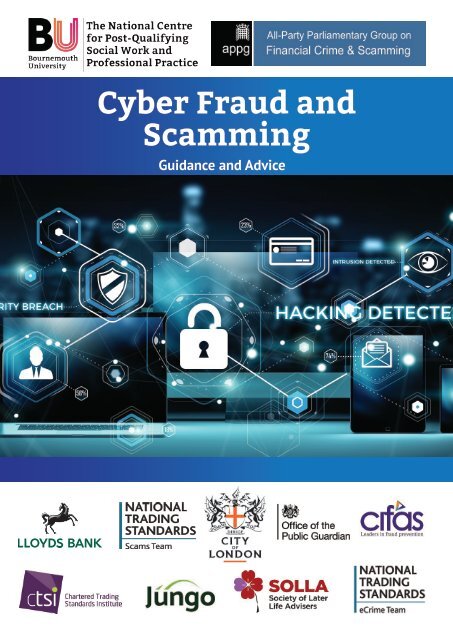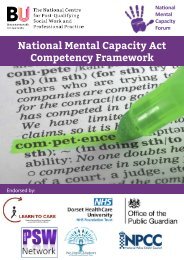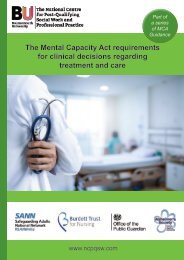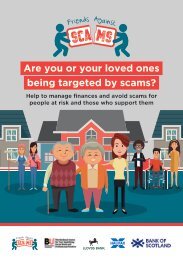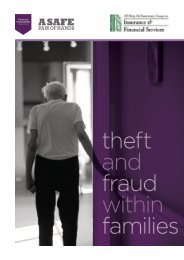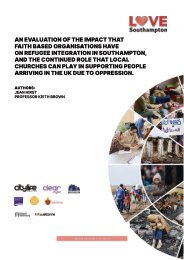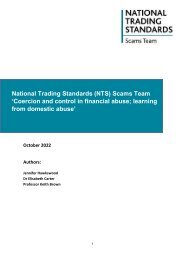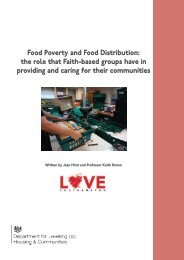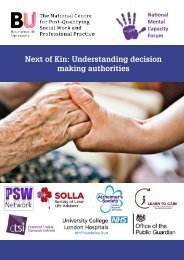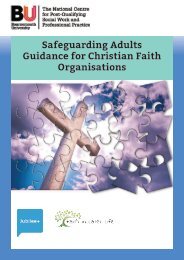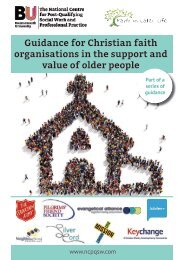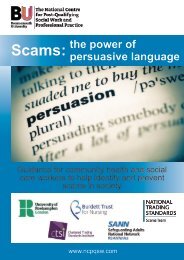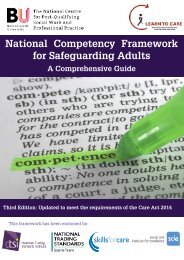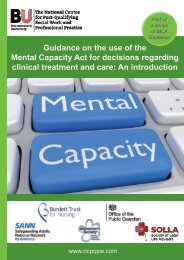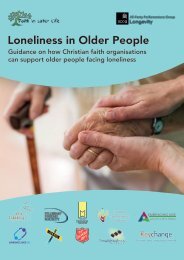Cyber Fraud and Scamming
This booklet focuses specifically on fraud and scamming; however cybercrime acts as a wider umbrella term, encompassing a range of criminal activity. Cybercrime can be simply defined as criminal activities carried out via the use of electronic devices, the internet and other forms of information and communications technology. The increasing use of computers and smartphones has facilitated a growth in the use of these systems as enablers of all types of crime, including: economic related cybercrime; organised crime; malicious and offensive communications; cyber stalking and harassment; and cyber terrorism.
This booklet focuses specifically on fraud and scamming; however cybercrime acts as a wider umbrella term, encompassing a range of criminal activity. Cybercrime can be simply defined as criminal activities carried out via the use of electronic devices, the internet and other forms of information and communications technology. The increasing use of computers and smartphones has facilitated a growth in the use of these systems as enablers of all types of crime, including: economic related cybercrime; organised crime; malicious and offensive communications; cyber stalking and harassment; and cyber terrorism.
You also want an ePaper? Increase the reach of your titles
YUMPU automatically turns print PDFs into web optimized ePapers that Google loves.
<strong>Cyber</strong> <strong>Fraud</strong> <strong>and</strong><br />
<strong>Scamming</strong><br />
Guidance <strong>and</strong> Advice
Foreword<br />
Professor Keith Brown<br />
Director of The National Centre for<br />
Post-Qualifying Social Work <strong>and</strong><br />
Professional Practice<br />
The National Centre for Post-Qualifying<br />
Social Work <strong>and</strong> Professional Practice at<br />
Bournemouth University has been leading<br />
national research in the area of financial<br />
fraud <strong>and</strong> scamming for a number of years<br />
now <strong>and</strong> thus, we were keen to produce<br />
new guidance <strong>and</strong> advice on cyber fraud <strong>and</strong> scamming with the key national partners<br />
that we work with in this area. Unfortunately, there is now clear evidence that criminals<br />
are moving into cyber-enabled fraud. These frauds are similar to those carried out via<br />
other mediums but with the use of computers <strong>and</strong> the internet.<br />
I do want to thank the many organisations that have assisted us in the production of this<br />
All Party Parliamentary Group (Financial <strong>Scamming</strong> <strong>and</strong> <strong>Fraud</strong>) report. In particular, the<br />
National Trading St<strong>and</strong>ards eCrime Team, The National Trading St<strong>and</strong>ards Scams Team,<br />
The City of London Scams Team, Cifas, CTSI, Jungo <strong>and</strong> SOLLA.<br />
The team at the National Centre are all totally committed to raising awareness <strong>and</strong><br />
fighting against this terrible crime <strong>and</strong> its impact. I, therefore, would like to express my<br />
sincere thanks to all at the NCPQSW for their dedication, commitment <strong>and</strong> sheer hard<br />
work in this area; it truly is amazing – thank you.<br />
We are committed to working with these bodies <strong>and</strong> many other leading agencies to<br />
ensure that great <strong>and</strong> consistent advice is provided to all in society, in order to help<br />
tackle <strong>and</strong> reduce this appalling crime <strong>and</strong> its often devastating consequences on<br />
victims.<br />
This work is far from complete though <strong>and</strong> we will continue to research <strong>and</strong> develop our<br />
ideas <strong>and</strong> underst<strong>and</strong>ing of these crimes. If you would like to contribute your thoughts<br />
<strong>and</strong> expertise in any way, please do contact me. The task is huge <strong>and</strong> we only have a<br />
chance of tackling this growing problem in society if we work together.
Connor Burns<br />
M.P. Chair APPG Financial Crime<br />
<strong>and</strong> <strong>Scamming</strong><br />
The most recent Office of National Statistics<br />
Engl<strong>and</strong> <strong>and</strong> Wales Crime Survey showed that<br />
there were over 3.5 million incidents of fraud in<br />
the year ending September 2018; over half of<br />
these incidents being cyber related.<br />
<strong>Fraud</strong> is the volume crime of the 21st century<br />
<strong>and</strong>, unless steps are taken to arrest its growth,<br />
this will continue to grow. With a rise in the number of people banking, shopping, dating <strong>and</strong><br />
sharing online this trend is only going to increase.<br />
The common perception is that the elderly are most at risk of scams. This is not the case for<br />
<strong>Cyber</strong> <strong>Fraud</strong> <strong>and</strong> Scams. Research demonstrates that all age groups are susceptible to online<br />
fraud <strong>and</strong> scams, with fraudsters targeting different age groups with different types of fraud.<br />
Anyone who is active online has the potential to fall victim to cyber scamming; most of us<br />
are online in one way or another <strong>and</strong> are therefore potential targets. This is why the All-Party<br />
Parliamentary Group on Financial Crime <strong>and</strong> <strong>Scamming</strong> decided to further its underst<strong>and</strong>ing<br />
in the area.<br />
In 2017 the All-Party Parliamentary Financial Group on Crime <strong>and</strong> <strong>Scamming</strong> was set up<br />
<strong>and</strong>, with the National Centre of Post-Qualifying Social Work <strong>and</strong> Professional Practice at<br />
Bournemouth University, worked with key national organisations in the field, including<br />
the National Scams Team <strong>and</strong> The Chartered Trading St<strong>and</strong>ards Institute to pull together<br />
an information resource pack: Financial <strong>Scamming</strong> <strong>and</strong> <strong>Fraud</strong>. It was clear from this initial<br />
research that the issue is substantial <strong>and</strong> will not be addressed without a clear <strong>and</strong> consistent<br />
approach to tackle the problem.<br />
To this end, The National Centre of Post-Qualifying Social Work <strong>and</strong> Professional Practice has<br />
sought to bring the research <strong>and</strong> information around the area of <strong>Cyber</strong> <strong>Fraud</strong> <strong>and</strong> <strong>Scamming</strong><br />
into one useful document to help us all underst<strong>and</strong> <strong>and</strong> protect ourselves from becoming<br />
victims. The scale of the problem means it is a crime we will find difficult to evade; therefore,<br />
we all need to take steps to protect ourselves, our families <strong>and</strong> our communities.<br />
I commend this report <strong>and</strong> its recommendations to politicians <strong>and</strong> policymakers of all hues.<br />
The scale of this threat is too large, <strong>and</strong> the risks to society too great, to be ignored any<br />
longer.
What is <strong>Cyber</strong> <strong>Fraud</strong>?<br />
This booklet focuses specifically on fraud <strong>and</strong> scamming; however<br />
cybercrime acts as a wider umbrella term, encompassing a range<br />
of criminal activity. <strong>Cyber</strong>crime can be simply defined as criminal<br />
activities carried out via the use of electronic devices, the internet<br />
<strong>and</strong> other forms of information <strong>and</strong> communications technology.<br />
The increasing use of computers <strong>and</strong> smartphones has facilitated a<br />
growth in the use of these systems as enablers of all types of crime,<br />
including: economic related cybercrime; organised crime; malicious<br />
<strong>and</strong> offensive communications; cyber stalking <strong>and</strong> harassment; <strong>and</strong><br />
cyber terrorism.<br />
<strong>Fraud</strong>s committed<br />
directly against<br />
individuals are<br />
estimated at around<br />
£6.8 billion per<br />
year<br />
Annual <strong>Fraud</strong> Indicator, 2017<br />
Whether you use the term ‘fraud’ or ‘scam’, the goal for the<br />
perpetrators of these offenses are always the same: to gain an<br />
advantage, typically financially, over others using deceptive<br />
means. Scams come in varying forms across varying mediums<br />
but all involve deliberate deception, intending to mislead <strong>and</strong><br />
often appealing to visceral needs <strong>and</strong> desires, in order to trick<br />
the intended target for finance gain.<br />
<strong>Cyber</strong> <strong>Fraud</strong> can be broadly categorised into two<br />
distinct categories: cyber-dependent fraud <strong>and</strong><br />
cyber-enabled fraud.<br />
FRAUD ACT 2006<br />
<strong>Fraud</strong> Act 2006 states that fraud is<br />
committed in three specific ways with<br />
different types of scams falling into each<br />
category:<br />
(a) <strong>Fraud</strong> by false representation<br />
(b) <strong>Fraud</strong> by failing to disclose information<br />
(c) <strong>Fraud</strong> by abuse of position (<strong>Fraud</strong> Act,<br />
2006, Chapter 35 (1))<br />
THE CONSUMER PROTECTION<br />
FROM UNFAIR TRADING<br />
REGULATIONS 2008<br />
The Consumer Protection from Unfair<br />
Trading Regulations 2008 makes<br />
misleading actions or omissions by traders<br />
a criminal offence. If a trade, business or<br />
service interaction is untruthful, likely<br />
to deceive, lead to a person engaging in<br />
a transaction they would not normally<br />
do, or hides or leaves out crucial<br />
information (Age UK, 2015). This includes<br />
unscrupulous behaviour by legitimate<br />
traders.
<strong>Cyber</strong>-Dependent <strong>Fraud</strong><br />
<strong>Fraud</strong>ulent activity that can only be committed via the use of information communications<br />
technology, primarily targeting computers <strong>and</strong> networks. This type of cyber-crime poses the greatest<br />
threat to public services <strong>and</strong> businesses but can also affect individuals due to the collection of<br />
personal data, leading to further fraudulent activity.<br />
The primary types of cyber-dependent crimes are:<br />
Hacking: The unauthorised use of, or<br />
access into, computers <strong>and</strong> networks, by<br />
exploiting vulnerabilities. This access<br />
can then be used to gather personal data<br />
<strong>and</strong> information, of which the impact can<br />
be significant financial losses for larger<br />
organisations, but can also result in the<br />
personal <strong>and</strong> financial data of individuals<br />
being compromised, leading to further<br />
fraudulent activities.<br />
Disruption of Computer Functionality: Often referred<br />
to as ‘malware’ <strong>and</strong> distributed by unsolicited or junk<br />
mail. Malicious software is designed to interfere with<br />
how computers <strong>and</strong> networks function, most frequently<br />
seen in the form of viruses, worms, Trojans, spyware<br />
<strong>and</strong> ransomware. Malware performs functions such as;<br />
undertaking hidden or unauthorised actions, damaging<br />
or deleting hardware, software or files, gathering<br />
sensitive <strong>and</strong> personal information or monitoring<br />
activity.<br />
Other types of Disruption of Computer Functionality, such as Denial-of-Service (DoS) <strong>and</strong> Distributed<br />
Denial-of-Service (DDoS) attacks, most frequently aimed at organisations <strong>and</strong> businesses rather than<br />
individuals, are designed to interrupt or suspend services <strong>and</strong> systems <strong>and</strong> make web-based services<br />
unavailable to users.<br />
<strong>Cyber</strong> -Enabled <strong>Fraud</strong><br />
Offenses which can be committed without the use of<br />
information communications technology but can be increased<br />
in their scale, impact <strong>and</strong> reach by the use of computers <strong>and</strong><br />
computer networks. <strong>Cyber</strong>-enabled frauds are similar to those<br />
carried out via other mediums, such as mail, telephone <strong>and</strong><br />
doorstep scams, but can often target individuals on mass,<br />
increasing the number of potential targets.<br />
This section will look at the most common types of cyberenabled<br />
fraud <strong>and</strong> provide some examples. This is by no means<br />
an exhaustive list <strong>and</strong> one type of fraud can overlap with<br />
another. <strong>Cyber</strong>-enabled frauds, as with mail <strong>and</strong> telephone<br />
frauds, are constantly evolving as the public becomes aware<br />
<strong>and</strong> as scammers adapt. Acts of fraud, however, do follow certain<br />
patterns of behaviour. This section is designed to help you spot<br />
the common identifiable signs of scams <strong>and</strong> take appropriate<br />
action.<br />
<strong>Cyber</strong>-enabled<br />
frauds are the most<br />
common form of<br />
all cybercrime <strong>and</strong><br />
fraud offences with<br />
over half of fraud<br />
incidents reported in<br />
the Crime Survey for<br />
Engl<strong>and</strong> <strong>and</strong> Wales<br />
being cyber related<br />
(ONS, 2018).<br />
The majority of cyber-enabled frauds can be aligned with the following four broad<br />
categories:<br />
Authorised Push<br />
Payment Scams<br />
Advance Fee<br />
<strong>Fraud</strong><br />
Consumer <strong>and</strong><br />
Retail <strong>Fraud</strong><br />
Bank <strong>and</strong> Credit<br />
Card <strong>Fraud</strong>
Who does cyber fraud affect?<br />
<strong>Cyber</strong> fraud can be targeted at anyone, from individuals to companies <strong>and</strong> organisations. <strong>Cyber</strong>dependent<br />
fraud tends to be targeted at businesses <strong>and</strong> organisations where vast amounts of<br />
data can be accessed <strong>and</strong> harvested, whereas cyber-enabled fraud is more frequently targeted at<br />
individuals. However, these two types of fraud are not mutually exclusive <strong>and</strong> may interact on a<br />
practical level; for example, personal information obtained from organisations may, in turn, be used to<br />
target individuals.<br />
1.9 million<br />
incidents of<br />
<strong>Cyber</strong>-related<br />
frauds were<br />
reported in the<br />
year ending<br />
September<br />
2018.<br />
(ONS, 2018)<br />
How big is the problem?<br />
3.5 million incidents of fraud were reported in the year ending September 2018, amounting to almost<br />
a third of all reported crimes in that same year. <strong>Fraud</strong> offence data was collated by the National <strong>Fraud</strong><br />
Intelligence Bureau (NFIB) from three reporting bodies: Action <strong>Fraud</strong> <strong>and</strong> two industry bodies, Cifas<br />
<strong>and</strong> UK Finance. <strong>Cyber</strong>-related fraud accounted for over half of reported fraud incidents during this<br />
period, a total of 1.9 million incidents.<br />
The Crime Survey for Engl<strong>and</strong> <strong>and</strong> Wales (ONS, 2018) reported a 33% decrease in the number of<br />
viruses being reported in the year ending September 2018, in comparison with the previous year.<br />
However, the number of incidents involving “unauthorised access to personal information” has<br />
remained relatively consistent, with 470,000 offences being reported.
Who is at risk?<br />
Everyone! <strong>Fraud</strong>sters target different age<br />
groups depending on the type of fraud. Cifas<br />
(2018) reported that criminals target younger<br />
people to become money mules, which are<br />
individuals who allow their bank account to<br />
be used to move the proceeds of crime. Over<br />
32,000 mule accounts were identified in<br />
2017, which was an increase of 11% from the<br />
previous year, <strong>and</strong> 71% of which were held by<br />
males. However, individuals over the age of<br />
60 were most likely to be victims of account<br />
takeovers, whilst individuals between the<br />
ages of 31 <strong>and</strong> 60 saw a higher occurrence of<br />
impersonation.<br />
For further information, please see The<br />
<strong>Fraud</strong>scape (Cifas, 2018).<br />
<strong>Fraud</strong> against older people<br />
Factors associated with older age such as bereavement, cognitive impairment, social isolation <strong>and</strong><br />
poverty can increase susceptibility to responding to scam approaches (Age UK, 2015). In addition, the<br />
increasing use of the internet <strong>and</strong> e-communications has provided criminals with a new way to target<br />
a global audience (Chang, 2008). Between 2016 <strong>and</strong> 2017, the top 4 types of fraud affecting the 60-99<br />
age group were computer software service fraud, advance fee frauds, online shopping <strong>and</strong> auctions<br />
<strong>and</strong> computer virus/malware/spyware. These figures demonstrate particular vulnerabilities for this age<br />
group relating to cyber scamming.<br />
Loneliness <strong>and</strong> social isolation have been identified as contributory factors to susceptibility to scams<br />
<strong>and</strong> fraud, with socially isolated older adults being particularly susceptible to financial scamming<br />
(Lubben et al. 2015). However, loneliness <strong>and</strong> social isolation are not exclusive to older adults, as<br />
individuals of any age who do not have a social network may have a limited awareness of scams <strong>and</strong><br />
there may be fewer opportunities for other people to notice, identify or intercept scams.<br />
You do not need to be socially isolated to be a target of cyber scammers. Action <strong>Fraud</strong> recorded an<br />
overall rise in computer misuse, particularly in respect to hacking via the use of social media <strong>and</strong> email,<br />
which has increased by 35%, with 9,458 offences reported over the previous 12 months.<br />
Anyone who is online<br />
has the potential to<br />
fall victim to cyber<br />
scamming! The vast<br />
majority of us are<br />
online in one way or<br />
another <strong>and</strong> therefore a<br />
potential target.
Why people respond to scams?<br />
Scammers appeal to basic human needs <strong>and</strong> motivations such as opportunities which lead<br />
to financial security or companionship which envoke emotional responses. The persuasive<br />
techniques used by scammers are designed to elicit visceral responses, which can encourage quick<br />
or unwise decision making, stopping individuals from thinking about the scam for long enough to<br />
consider the risks or credibility. Older people may demonstrate some additional vulnerability to<br />
cyber scams but they are not alone.<br />
Social Engineering: criminals often use social<br />
engineering tactics to trick customers into<br />
revealing their online banking security details,<br />
through scam phone calls, texts <strong>and</strong> emails. Most<br />
of us tend to want to be helpful <strong>and</strong> cooperative;<br />
fraudsters <strong>and</strong> scammers take advantage of this<br />
<strong>and</strong> will skilfully manipulate targets to divulge<br />
personal information. This is often achieved<br />
through impersonation of a legitimate organisation,<br />
such as banks, HMRC, TV licencing or a government<br />
department.<br />
The 2018 Global <strong>Fraud</strong> <strong>and</strong> Identity Report<br />
Device ownership<br />
1. Smartphone (91%)<br />
2. Laptop (83%)<br />
3. Tablet (65%)<br />
4. PC (62%)<br />
5. Smartwatch (21%)<br />
6. Smarthome device (13%)<br />
Top Activities on Devices<br />
1. Online shopping (90%)<br />
2. Personal Banking (88%)<br />
3. Play Video Games (51%)<br />
4. Apply for Driver’s License (51%)<br />
5. Get quotes/Buy Insurance (49%)<br />
6. Apply for Credit Cards/ Loans (48%)<br />
7. File Taxes (45%)<br />
Over half of the<br />
fraud incidents<br />
reported in last<br />
year’s CSEW were<br />
reported to be cyber<br />
related.<br />
The 2018 Global <strong>Fraud</strong> <strong>and</strong> Identity Report,<br />
Experian, 2018.
Social Media<br />
Many perpetrators aiming to commit financial fraud ‘hide’ behind the fact that they may not be readily<br />
identifiable by their social media accounts, which is why these methods are often used to approach<br />
targets.<br />
It is vital that you frequently review what information<br />
exists online about you - review all the privacy <strong>and</strong> security<br />
settings on your social media pages regularly<br />
It takes less than a second to click on a link in a tweet, or a post<br />
on your social media or in a direct message – either advertising<br />
a gift or special offer – or, ironically, warning you to take action<br />
to avoid some kind of financial loss. This could appear to be<br />
from anybody, including a trusted contact, if their social media<br />
account has been compromised or identity spoofed. The link<br />
might take you to a website requesting confidential information<br />
about you, or cause your device to be infected with malware.<br />
Alternatively, the post, tweet or message may instruct you to<br />
make a phone call to a specified number, which can either<br />
result in confidential details being requested, or be to a rate<br />
number resulting in exorbitant charges being added to your<br />
phone bill.<br />
Some of the risks include:<br />
• Identity theft – having<br />
your credentials controlled<br />
• Account hijacking - having<br />
your online accounts being<br />
taken over<br />
• Data theft - having your<br />
contact details obtained<br />
<strong>and</strong> used<br />
Get Safe Online’s top 5 risks to be aware of:<br />
• Different social media channels might require different levels of<br />
privacy. For example, Facebook settings should be on private as<br />
the way we use the platform is different to Twitter or Instagram.<br />
• Think twice about posts <strong>and</strong> photos you’re sharing. Driving<br />
licences, passports, letters <strong>and</strong> other documents contain sensitive<br />
information that you need to prove your ID.<br />
• When you enter your details to a website or app, always check<br />
terms <strong>and</strong> conditions, <strong>and</strong> even then be careful what you’re<br />
agreeing to others knowing about you or your account.<br />
• Posting <strong>and</strong> sharing photos of when you’re away on holiday or<br />
business could be signalling that your home is empty. Remember<br />
that today’s burglars are as social media savvy as you are.<br />
• Turn off location services in app settings on your devices: social<br />
media apps, cameras <strong>and</strong> others that might reveal location. This<br />
isn’t just about privacy, but you <strong>and</strong> your family’s personal safety.<br />
Most social networking<br />
sites, for example Facebook,<br />
have a means of reporting<br />
such issues. Twitter is also<br />
introducing an in-Tweet<br />
‘Report Abuse’ button across<br />
all apps <strong>and</strong> its website.<br />
Find further advice on this here:<br />
• https://www.facebook.com/help/safety<br />
• https://help.twitter.com/en/safety-<strong>and</strong>-security/account-security-tips<br />
• https://myaccount.google.com/security<br />
• https://help.instagram.com/<br />
• https://support.snapchat.com/en-GB/a/privacy-settings2<br />
If you are affected: gather <strong>and</strong> document as much evidence as you can <strong>and</strong> report the incident to the<br />
police <strong>and</strong> seek help <strong>and</strong> support from relevant organisations.<br />
Written by Stevie Corbin-Clarke
Authorised Push Payment (APP) Scams<br />
Authorised push payment scams (APP) are where a person is tricked into authorising the transfer<br />
of money into an account controlled by the fraudster. UK finance data on APP fraud show there were<br />
43,875 cases <strong>and</strong> total losses of £236 million in 2017, increasing to £354 million in 2018.<br />
Individuals are convinced by the scammer to:<br />
• a) transfer funds to another person, but are instead deceived into transferring the funds to a<br />
different person or;<br />
• b) transfer funds to another person for what they believed are legitimate purposes but which were<br />
in fact fraudulent.<br />
Contingent Reimbursement Model Code for Authorised Push Payment<br />
Scams<br />
The Authorised Push Payment (APP) Scams Steering Group has agreed a<br />
voluntary code of good practice to address APP fraud.<br />
Payment service providers that sign up to the Code will commit to:<br />
• protecting their customers, including procedures to detect, prevent <strong>and</strong><br />
respond to APP fraud, with a greater level of protection for customers<br />
considered to be vulnerable to this type of fraud; <strong>and</strong><br />
• preventing accounts from being used to launder the proceeds of APP<br />
fraud, including procedures to prevent, detect <strong>and</strong> respond to the receipt<br />
of funds from this type of fraud.<br />
The most<br />
common type<br />
of APPs are<br />
impersonation<br />
scams, typically<br />
impersonating<br />
official bodies<br />
such as Banks,<br />
HMRC or TV<br />
licensing agency.<br />
Confirmation of Payee (CoP): At present, only the account number <strong>and</strong> sort code need to match for<br />
payments to be successful, meaning fraudsters pose as someone legitimate to trick victims into<br />
paying them money. The proposed Confirmation of Payee system means anyone making a payment<br />
will be alerted if the name does not match the account, cutting down on the number of APP scams in<br />
which people are conned into sending money into a scammers account.<br />
HMRC Scam<br />
During March, April <strong>and</strong> May 2018,<br />
HMRC received nearly 250,000<br />
reports of phishing <strong>and</strong> made over<br />
6,000 requests to have websites<br />
shut down.<br />
According to Ofcom<br />
Communications Market Report<br />
2018, 95% of 16-24-year-olds<br />
owned a smartphone last year <strong>and</strong><br />
51% of those aged over 55+ owned<br />
a smartphone in the same period.<br />
Smartphones are often how many<br />
members of the public receive text<br />
<strong>and</strong> email scams.<br />
The tax authority is urging anyone<br />
who knows someone that could be<br />
vulnerable to scams to warn <strong>and</strong><br />
prepare them.<br />
HMRC’s top tips:<br />
• Recognise the signs - genuine organisations like banks<br />
<strong>and</strong> HMRC will never contact you out of the blue to ask for<br />
your PIN, password or bank details.<br />
• Stay safe - don’t give out private information, reply to<br />
text messages, download attachments or click on links in<br />
emails you weren’t expecting.<br />
• Take action - forward suspicious emails <strong>and</strong> details of<br />
suspicious calls claiming to be from HMRC to phishing@<br />
hmrc.gov.uk <strong>and</strong> texts to 60599. If you have suffered<br />
financial loss contact Action <strong>Fraud</strong> on 0300 123 2040 or<br />
use their online fraud reporting tool.<br />
• Check GOV.UK for information on how to avoid <strong>and</strong><br />
report scams <strong>and</strong> recognise genuine HMRC contact.<br />
Action <strong>Fraud</strong>, Springtime tax scams target young <strong>and</strong><br />
vulnerable, warns HMRC, 24/04/2017
TV Licensing phishing emails<br />
How does it work?<br />
1Firstly, the scammers send fake emails<br />
saying TV Licensing have been trying to<br />
get hold of you regarding a refund or an overpayment.<br />
Other versions might claim that your<br />
billing details need to be updated. However, all<br />
versions of the emails contain links to a cloned<br />
version of the official TV Licensing website<br />
that is designed to harvest your login <strong>and</strong> bank<br />
details.<br />
The cloned site asks you to login <strong>and</strong> prompts<br />
you for your full name, phone number, date of<br />
birth, address, email address, account number,<br />
sort code, card details, <strong>and</strong> security or CVV<br />
numbers on the back of the card.<br />
2The second stage typically occurs a week<br />
or two later, when criminals posing as bank<br />
staff call to warn you that your account has been<br />
compromised. The criminals convince you that<br />
you must urgently move money into a so-called<br />
‘safe’ account.<br />
3<br />
The final stage is stealing it all.<br />
It is a convincing scam because the licensing<br />
emails appear authentic <strong>and</strong> gets victims to<br />
give criminals the details they need to appear<br />
to be from the victim’s bank. For instance, at the<br />
cold calling stage, some scammers spoof caller<br />
IDs based on the victim’s sort code, address <strong>and</strong><br />
bank details to add to the illusion they really<br />
are the victim’s bank.<br />
What to look out for<br />
The TV Licensing agency never send refund information by email, or<br />
ask you for payment or personal details, <strong>and</strong> is investigating the scam.<br />
The emails use catchy subject lines <strong>and</strong><br />
phrases like ‘refund’, ‘renew now’ or ‘security<br />
alert’ to pressure victims into clicking<br />
through to the cloned site.<br />
The fakes tend to begin with an<br />
impersonal greeting, rather than using the<br />
victim’s real name. Genuine TV Licensing<br />
emails will include your real name.<br />
You should always check the<br />
sender’s email address, <strong>and</strong> hover<br />
over any links to check if the URL<br />
goes to the genuine TV Licensing<br />
site.<br />
The grammar <strong>and</strong> spelling<br />
may also be poor.<br />
TV License - Still Pending<br />
After the last annual calculation we have<br />
determined that you are eligible to recieve a<br />
tv license refund. Due to invalid account<br />
detail records, we were unable to credit your<br />
account.<br />
Please submit the tv licence request <strong>and</strong> allow<br />
us 2-4 weeks for the amount to be credit to<br />
your account<br />
Click “Refund Me Now” <strong>and</strong> follow the steps in<br />
order to have us process your request.<br />
Refund me Now <br />
Best regards,<br />
TV License<br />
Impersonal<br />
greeting<br />
Poor spelling<br />
<strong>and</strong> grammar<br />
Catchy phrase<br />
Link to clone<br />
TV Licensing<br />
website<br />
What to do if you get one?<br />
In 2018, Action <strong>Fraud</strong> had over 7,000 reports<br />
of this scam. If you receive one of these emails,<br />
please delete it <strong>and</strong> do not click any of the links<br />
they contain.<br />
Finally, if you have clicked any of the links <strong>and</strong><br />
submitted personal or financial information,<br />
report it immediately to Action <strong>Fraud</strong> on 0300<br />
123 2040. If you gave any bank details, you will<br />
also need to ring your bank straight away.<br />
You can find more information from the official TV Licensing website. www.tvlicensing.co.uk<br />
Example provided by Stephen Forster, National Communications Officer for the National Trading<br />
St<strong>and</strong>ards eCrime Team
Advance Fee <strong>Fraud</strong><br />
Advance fee fraud (AFF) is where an individual receives a communication requesting money, often<br />
for a variety of emotive reasons. This type of fraud often involves an upfront payment being made<br />
on the basis of the prospective receipt of goods or often financial gain, such as inheritance or lottery<br />
scams. Advance fee frauds can be linked to general mass phishing campaigns, or can be highly<br />
personalised, such as in romance or clairvoyant scams. These types of scams, like many others,<br />
are underpinned by social engineering. However, are often designed to exploit the vulnerability of<br />
individuals, provoking emotional responses <strong>and</strong> often having a long term negative impact on the<br />
individual.<br />
• Career opportunity scams<br />
• Clairvoyant or psychic scams<br />
• Romance scams<br />
• <strong>Fraud</strong> recovery fraud<br />
• Inheritance fraud<br />
• Investment <strong>Fraud</strong><br />
• Loan scams<br />
• Lottery, prize draw <strong>and</strong> sweepstake<br />
scams<br />
• Rental fraud<br />
• West African letter or 419 fraud<br />
• Work from home / business<br />
opportunity scams<br />
• Vehicle matching scams<br />
Social Media Investment <strong>Fraud</strong><br />
Action <strong>Fraud</strong> has seen an increased number<br />
of investment schemes being advertised on<br />
Instagram over recent months, with young<br />
people aged between 20 <strong>and</strong> 30 the most likely<br />
to fall victim.<br />
<strong>Fraud</strong>sters are advertising ‘get rich quick’<br />
investment schemes on the app, which<br />
promise a high return within 24 hours. A<br />
£600 investment is initially requested which<br />
fraudsters claim will be multiplied within 24<br />
hours.<br />
Victims are then making payments via bank<br />
transfer to the fraudster’s bank account.<br />
<strong>Fraud</strong>sters are then sending screenshots of<br />
thous<strong>and</strong>s in profit crediting their accounts,<br />
which they claim can be released for a fee.<br />
Victims have requested to withdraw their funds<br />
while they’re still in profit, <strong>and</strong> at this stage the<br />
fraudsters are stopping contact with the victim<br />
<strong>and</strong> closing the Instagram account.<br />
Stay safe when scrolling:<br />
• Never respond to any requests to send money,<br />
or have money transferred into your account<br />
by someone you don’t know <strong>and</strong> trust. These<br />
types of requests should always raise a red<br />
flag. If something feels wrong then it is<br />
usually right to question it.<br />
• Don’t immediately agree to any offer that<br />
involves an advance payment or having to<br />
sign a contract on the spot. Always speak with<br />
a friend or family member first.<br />
• Always check the credentials of any financial<br />
company on the Financial Conduct Authority’s<br />
(FCA) website: – they should be on the<br />
register. Contact the preferred company<br />
directly <strong>and</strong> reject any offers made through<br />
unsolicited communications.<br />
Action <strong>Fraud</strong>: <strong>Fraud</strong>ulent investments being<br />
advertised on social media, 25-02-2019.<br />
Every report maters – if you have been a victim of fraud or cybercrime, report it to Action <strong>Fraud</strong> online<br />
or by calling 0300 123 2040.
Romance Scams<br />
How does it work?<br />
1<br />
You might think<br />
you have met<br />
your perfect partner<br />
through an online<br />
dating website <strong>and</strong><br />
they seem interested<br />
because they are asking<br />
lots of questions about<br />
you. <strong>Fraud</strong>sters contact<br />
their targets using fake<br />
profiles in an attempt<br />
to build what feels like<br />
a loving relationship.<br />
2Once a fraudster is confident<br />
that they have won your trust,<br />
they will invent a reason to ask for<br />
your help. They will use the emotional<br />
attachment you have built <strong>and</strong> ask<br />
you to help them out by sending<br />
money. For example, they may<br />
attempt to invoke a visceral response<br />
by telling you a family member is<br />
ill <strong>and</strong> they need money for medical<br />
treatment. Otherwise, they may have<br />
arranged to visit you, but tell you they<br />
need money to pay for the flight or<br />
because their ticket has been stolen.<br />
3<br />
Once you send<br />
them money, the<br />
fraudsters will keep<br />
coming back <strong>and</strong><br />
invent new reasons for<br />
you to send them more.<br />
They will also have<br />
all of the personal<br />
information you have<br />
told them <strong>and</strong> may<br />
use it in an attempt<br />
to blackmail you into<br />
continuing to give<br />
them money.<br />
How do you spot one?<br />
Scammers will generally use typical grooming<br />
techniques <strong>and</strong> might leave other clues which<br />
suggest that they have bad intentions. They<br />
will often quickly adopt pet names or terms of<br />
endearment in their messages to you <strong>and</strong> you<br />
may notice early on that they do not answer<br />
basic questions, such as where they live <strong>and</strong><br />
work. Scammers will also prefer to switch to<br />
communications via social media, texting or<br />
email <strong>and</strong> will encourage you to chat outside of<br />
the security of the dating website. A third party is<br />
often brought into the conversation to make the<br />
scammer’s lies seem more plausible.<br />
What can you do to avoid them?<br />
• Trust your instincts<br />
• Avoid giving away too many personal details<br />
when online dating<br />
• Never send money or give your bank details to<br />
someone you have only met online<br />
• Choose a reputable dating website<br />
• Use the site’s messaging service. <strong>Fraud</strong>sters<br />
will want to quickly switch to other forms<br />
messaging so there is no evidence of them<br />
asking for money<br />
• Reverse image search can find photos that<br />
have been taken from somewhere else - they<br />
could have been stolen from anywhere<br />
What to do if you have come into contact with a romance scammer?<br />
• Immediately break off all contact with the<br />
fraudster <strong>and</strong> do not send any more money<br />
• It can be embarrassing to feel tricked into<br />
thinking you have formed a relationship<br />
online, but if you report any suspicious<br />
behaviour to the chat room operator <strong>and</strong><br />
Action <strong>Fraud</strong>, they will take your report in<br />
confidence. Report online or call:<br />
0300 123 2040.<br />
Example provided by Stevie Corbin-Clarke, Bournemouth University.
Consumer <strong>and</strong> Retail <strong>Fraud</strong><br />
The national Crime Survey for Engl<strong>and</strong><br />
<strong>and</strong> Wales (CSEW) has reported a 27%<br />
increase in retail fraud in the July 2017-<br />
2018 period from the same period the<br />
previous year.<br />
Consumer <strong>and</strong> retail fraud commonly<br />
covers deceptive business practices,<br />
where the consumer believes they are<br />
purchasing goods or services but are<br />
actually being defrauded. These frauds<br />
can relate to inaccurate claims or false<br />
promises, as well as counterfeit or nonexistent<br />
products or services.<br />
Shopping <strong>and</strong> auction fraud frequently involves<br />
purchased goods not arriving, or buyers receiving goods<br />
that are less valuable or significantly different to the<br />
original description. The most immediate problem<br />
being that the buyer is unable to return the goods or<br />
have the money refunded. Similarly, scammers take<br />
advantage of the dem<strong>and</strong> for popular goods or events,<br />
where websites are set up which look genuine, using a<br />
name or web address which appears very similar to a<br />
legitimate seller. If the buyer does receive a product, it<br />
may be counterfeit, <strong>and</strong> in the case of ticketing fraud<br />
the buyer may not even be aware of this until they are<br />
refused entry to an event when the organisers recognise<br />
the ticket as fake.<br />
Computer Software Service <strong>Fraud</strong><br />
If you receive a phone call, email or pop-up from your internet service provider saying your internet<br />
connection is about to be cut off, most of us would feel the need to take action. Our connection to the<br />
internet is what the majority of our devices, from Laptops to Smart TVs or streaming services, depend<br />
on. In 2017/18, Action <strong>Fraud</strong> received 22,609 reports of Computer Software Service fraud, with a total<br />
of £21,365,360 being lost to fraudsters, with the average age of victims being 63.<br />
These types of scams are not, however, limited to internet service providers. Scammers will purport to<br />
be from well-know reputable companies, such as Microsoft or Apple, contacting you to tell you there is<br />
a problem they can help you with.<br />
How does it work?<br />
1The email, pop-up or<br />
phone call will prompt<br />
you to call a number so<br />
that you can be connected<br />
with ‘tech support’, <strong>and</strong><br />
these numbers may appear<br />
similar to numbers listed on<br />
legitimate websites but they<br />
will connect the caller to a<br />
call centre, often based in<br />
another country.<br />
2The person offering you this<br />
technical support will appear to<br />
want to help you resolve your problem;<br />
this may include one or both of the<br />
following:<br />
• Remoting into your computer to find<br />
out what the problem is <strong>and</strong> fix it for<br />
you!<br />
• For a ‘discounted’ fee, they might offer<br />
you technical support whenever you<br />
need it.<br />
3<br />
The final stage<br />
is stealing it<br />
all.<br />
You give the<br />
scammer access to<br />
your PC <strong>and</strong> they<br />
can now find all<br />
your personal <strong>and</strong><br />
account details that<br />
are stored on it!<br />
Once the scammer has, with your permission, gained remote access to your device they are able to<br />
access all your files <strong>and</strong> personal information, install spyware or other harmful software, potentially<br />
locking you out of your own device <strong>and</strong> holding your files to ransom.<br />
NEVER let anyone who contacts you out of the blue remote into your device or PC.
In ‘purchasing’ the goods, the buyer has<br />
been required to give personal <strong>and</strong> financial<br />
information to make the original payment. This<br />
information is now available to the scammers<br />
<strong>and</strong> may be used for subsequent frauds.<br />
It is a good idea to have a separate method of<br />
payment for making online purchases <strong>and</strong>, where<br />
possible, use a digital wallet such as PayPal.<br />
Using a credit card for purchases between £100<br />
<strong>and</strong> £30,000 is recommended to ensure the<br />
purchase is covered under Section 75 of the<br />
Consumer Credit Action 1974, making the card<br />
company jointly liable with the retailer.<br />
• Online shopping <strong>and</strong><br />
auctions<br />
• Computer software<br />
service fraud<br />
• Ghost Brokers<br />
• Ticket fraud<br />
• Retail fraud<br />
How do you spot one?<br />
The initial contact will often be out of the blue<br />
<strong>and</strong> may not be associated with any problems<br />
arising with the device or internet connection.<br />
The scammers will also stress the importance<br />
of taking quick action, limiting your ability to<br />
think clearly. Legitimate computer firms do not<br />
make unsolicited phone calls to help you fix<br />
your computer. <strong>Fraud</strong>sters make these phone<br />
calls to try to steal from you <strong>and</strong>/or damage your<br />
computer with malware.<br />
What can you do to avoid a software<br />
service fraud?<br />
The best way to avoid this type of scam is not<br />
to be rushed into making a decision. An internet<br />
service provider, such as BT, will not require<br />
access to your device to address problems<br />
related to your internet connection. Similarly,<br />
Microsoft <strong>and</strong> Apple will not require credit card<br />
information to validate software.<br />
What to do if you have given someone access to your computer?<br />
If you have given someone access to your<br />
computer they may have gained access to all<br />
the information, including banking details <strong>and</strong><br />
passwords stored on that device.<br />
Change all passwords <strong>and</strong> authentication<br />
information on all accounts that may have<br />
been accessed. Do this on a different device or<br />
PC so that the scammers do not have the new<br />
information.<br />
Monitor your bank accounts <strong>and</strong> credit reports so<br />
you can detect any unfamiliar financial activity.<br />
Report any suspicious activity to your bank or<br />
card provider. If you have given the scammer any<br />
payment details, contact your provider to report<br />
the fraud.<br />
Run a malware checker or antivirus program<br />
on your machine. Check the device for malware<br />
or spyware which may have been installed <strong>and</strong><br />
still active. Do not use your device for anything<br />
confidential until you are sure the information is<br />
not still available to the scammers.<br />
If you have let a scammer into your PC,<br />
disconnect their connection as soon as you<br />
realise; this may involve turning off the Wi-Fi<br />
on your device or physically disconnecting the<br />
device from the internet.<br />
Report it to Action <strong>Fraud</strong> on 0300 123 2040.
Bank <strong>and</strong> Credit Card <strong>Fraud</strong><br />
Scammers will contact a target via email or<br />
social media pretending to be from genuine<br />
organisations, such as banks, the police or<br />
government departments <strong>and</strong> will then<br />
impersonate these organisations to extract<br />
personal or financial information from their<br />
intended target.<br />
Scammers use a variety of tactics to elicit<br />
a response from targets, often specifically<br />
impersonating organisations which will provoke<br />
an emotional response from targets. For example,<br />
they might indicate that there has been an issue<br />
in regards to payment, their account security or a<br />
refund or rebate is due to them.<br />
Shopping coupon scams<br />
If you saw a supermarket coupon for £75, £150<br />
or £250, it would get your attention… Right?<br />
Of course it would, <strong>and</strong> that’s exactly what<br />
coupon scammers rely on. This is because what<br />
appears to be a harmless, low level scam is really<br />
a cynical ploy to steal your money, your identity<br />
or banish you to a life on suckers’ lists.<br />
Personal <strong>and</strong> financial information can be<br />
obtained by allowing someone remote access<br />
to a computer or by a third party data breach.<br />
Therefore, this does not depend on the target<br />
h<strong>and</strong>ing over their details to the scammer <strong>and</strong><br />
they may not be aware that the scammers have<br />
obtained them.<br />
The ultimate goal of many different types of<br />
cyber-enabled <strong>and</strong> cyber-dependent fraud is to<br />
obtain an individual’s personal details to access<br />
their financial facilities. This allows the scammer<br />
maximum access to available funds, in addition to<br />
identity theft <strong>and</strong> dishonestly retaining wrongful<br />
credit.<br />
If you have not seen a fake coupon yet, you<br />
may see one soon because it is only a matter of<br />
time before someone shares one with you on<br />
Facebook, Twitter or WhatsApp, or before the<br />
scammers find another way to dangle one under<br />
your nose.<br />
How does it work?<br />
1You might see a social media<br />
post, or receive a WhatsApp<br />
message or text from a friend saying<br />
something like: “Asda is giving free<br />
£100 vouchers to EVERYONE for<br />
their wedding anniversary”.<br />
Sometimes they are referred to<br />
as ‘vouchers’, other times they are<br />
called ‘gift vouchers’ <strong>and</strong> latterly they<br />
have become ‘prizes’. They may come<br />
or appear to come from a friend, <strong>and</strong><br />
encourage you to pass them on to<br />
make them seem more believable.<br />
2There is always a link… BUT<br />
DON’T CLICK IT. The link leads<br />
to an online customer survey asking<br />
for your name, address, phone<br />
number, <strong>and</strong> date of birth in return<br />
for the voucher.<br />
This seems reasonable for the<br />
amount of money they are giving<br />
away, doesn’t it? In reality, it is<br />
enough information to take out<br />
a loan in your name, <strong>and</strong> you will<br />
never receive the promised vouchers<br />
anyway.<br />
3But wait,<br />
there is<br />
even more!<br />
They will<br />
also sell your<br />
details to other<br />
criminals to<br />
use, abuse<br />
<strong>and</strong> bombard<br />
you with more<br />
scams.<br />
So what can you do to avoid a coupon scam?<br />
The best way to avoid coupon scams is simply to ignore them. You should never click the links<br />
because you risk downloading malicious software to your computer or device. Whatever you do, you<br />
should never, ever give over any personal details. Finally, do NOT spread the scam by sharing any of<br />
the posts or messages with family <strong>and</strong> friends.
If scammers can obtain individual’s card <strong>and</strong> bank<br />
details, they can utilise them in a variety of ways:<br />
• By gaining direct access to bank accounts,<br />
credit cards <strong>and</strong> online banking facilities.<br />
• Applying for credit by impersonating the<br />
target<br />
• Cheque, plastic card <strong>and</strong> online<br />
bank accounts<br />
• Remote purchase fraud<br />
• Application fraud<br />
• Mortgage related fraud<br />
• M<strong>and</strong>ate fraud<br />
• Dishonestly retaining a wrongful<br />
credit<br />
In 2016, £432.3 million was lost to remote<br />
purchase fraud, a 9% increase on the<br />
previous year. The vast majority of this type<br />
of fraud involves the use of card details<br />
that have been fraudulently obtained<br />
through methods such as unsolicited<br />
emails or telephone calls or digital attacks<br />
such as malware <strong>and</strong> data hacks. The<br />
card details are then used to undertake<br />
fraudulent purchases over the internet,<br />
phone or by mail order. It is also known as<br />
‘card-not-present’ (CNP) fraud.<br />
<strong>Fraud</strong> the Facts 2017, Financial <strong>Fraud</strong> Action<br />
UK (FFA UK)<br />
How do you spot one?<br />
The fake shopping coupons you find in social media<br />
posts tend to have common, recognisable features.<br />
Such as:<br />
• supermarket br<strong>and</strong>ing<br />
• a prominent offer<br />
• an expiry date<br />
• a bar code<br />
• link to a rewards or<br />
offers page<br />
• copy underneath<br />
saying it is to<br />
celebrate some kind<br />
of anniversary.<br />
Scammers will often put the same barcode <strong>and</strong><br />
expiry dates on coupons for different supermarkets, a<br />
big giveaway that it is a centrally managed scam.<br />
What to do if you have entered your personal details<br />
Start monitoring your bank accounts <strong>and</strong> credit If you have clicked the link, you might also want<br />
rating using a credit report. This is necessary in to run a malware checker or antivirus program<br />
case the scammers have used your details to on your device, in case the link was malicious.<br />
open other accounts or taken out loans in your Report it to Action <strong>Fraud</strong> on 0300 123 2040.<br />
name.<br />
Example provided by Stephen Forster, National Communications Officer for the National Trading<br />
St<strong>and</strong>ards eCrime Team
Your digital footprint <strong>and</strong> identity<br />
It is important to underst<strong>and</strong> the extent of your digital footprint, or, in other words, the information<br />
about you that is publicly available on the internet. Your name, address, family <strong>and</strong> key details that all<br />
of us regularly publish about ourselves on social media provide a wealth of information for people<br />
looking to use your identity.<br />
The following provides some key advice to help secure your digital footprint <strong>and</strong> reduce the risk<br />
around your identity:<br />
Search for yourself - a good starting point when looking into your<br />
digital footprint is to type your name into several search engines<br />
such as Google or Bing. Take a good look at what information may<br />
be publicly available about you. This could be news articles; social<br />
media profiles old <strong>and</strong> new; images or work-related information.<br />
Take note <strong>and</strong> think how this could be used by a scammer.<br />
Phishing <strong>and</strong> personal<br />
data - phishing also<br />
contributes to the loss of<br />
personal information, so<br />
learning how to identify a<br />
phishing email <strong>and</strong> being<br />
wary of giving away your<br />
personal information,<br />
further reduces the risk of<br />
your data being stolen.<br />
Security settings -<br />
whether it is your social<br />
media profiles, shopping<br />
accounts or any other<br />
online login, privacy<br />
settings should be set as<br />
high as possible. Taking<br />
into consideration what<br />
information is publicly<br />
shared or discoverable.<br />
Clean up - review your online<br />
presence, whether that be<br />
on social media or online<br />
accounts, delete unused ones<br />
<strong>and</strong> take down information<br />
that is unnecessary. Also,<br />
consider the information<br />
that you have found such<br />
as dates of birth (or images<br />
posted about your birthday),<br />
addresses or check-ins<br />
showing your location.<br />
Has your data been lost or<br />
stolen? - more <strong>and</strong> more<br />
data breaches are being<br />
publicised where personal<br />
information has been lost<br />
or stolen. This personal<br />
information is often sold on<br />
both the surface web <strong>and</strong><br />
the dark web. Take note of<br />
emails you have received<br />
from companies that have<br />
lost your data <strong>and</strong>, if needed,<br />
change your security settings<br />
<strong>and</strong> password if there is an<br />
account.<br />
You can also see if you have<br />
been subject to large-scale<br />
breaches by visiting: www.<br />
haveibeenpwned.com<br />
Know your rights - as of May 2018, the General Data Protection Regulations (GDPR) brought about<br />
increased rights for you <strong>and</strong> your personal data. Knowing these will help you to underst<strong>and</strong> how you<br />
can go about reducing the amount of personal data out there about you but also how companies<br />
utilise your data. You have the right of access, to be informed, to delete <strong>and</strong> five other important rights.<br />
Visit www.ico.org.uk <strong>and</strong> look for individual rights for more information.
Passwords<br />
The most common complaint when it comes to securing online accounts <strong>and</strong> technology is the use<br />
of passwords. They can also be the most annoying part of our relationship with computers <strong>and</strong> the<br />
internet, as trying to remember unique <strong>and</strong> strong passwords is very difficult for most people to do.<br />
There is so much conflicting messaging <strong>and</strong> expectations that it becomes overwhelming in what to do<br />
with your passwords. Ultimately, it is about finding something that works for you but also keeps you<br />
secure.<br />
<strong>Cyber</strong> aware <strong>and</strong> the national cyber security centre (NCSC) underst<strong>and</strong> that there must be a balance<br />
between security <strong>and</strong> people. The following are some considerations around how to go about<br />
protecting yourself <strong>and</strong> using better passwords.<br />
Securing your email - using a strong<br />
<strong>and</strong> unique password for your email<br />
is crucial. If you think about it, your<br />
email is where you reset all your<br />
other security settings for your<br />
accounts <strong>and</strong> a major part of your<br />
online presence.<br />
Do not be personal - combined<br />
with your digital footprint,<br />
a lot of your personal<br />
information can be out there<br />
publicly. It’s important when<br />
choosing your password to not<br />
use personal information such<br />
as child or partner’s name,<br />
place of birth or a favourite<br />
holiday. All of this could be<br />
potentially found online <strong>and</strong><br />
easily guessed.<br />
Password managers - a really<br />
good way of managing your<br />
passwords is through the use<br />
of a password manager. These<br />
useful pieces of software<br />
come in the form of an<br />
application, either built into<br />
your browser or your computer.<br />
This then creates a really<br />
secure <strong>and</strong> unique password<br />
for every login <strong>and</strong> account<br />
for you. Password managers<br />
are incredibly convenient.<br />
However, you must ensure that<br />
the password <strong>and</strong> security for<br />
getting into it is a very strong<br />
password.<br />
Three r<strong>and</strong>om words - although complexity is useful in<br />
creating a strong password, it’s not particularly useful<br />
when you can’t remember it. A good way to create a<br />
strong <strong>and</strong> memorable password is to use three r<strong>and</strong>om<br />
words such as ‘carbookelephant’ or ‘blueshedtable’. Use<br />
words are memorable to you <strong>and</strong> adding numbers <strong>and</strong><br />
special characters such as ‘?’ or ‘!’ to make it even more<br />
secure such ‘4!carbookelephant?3’.<br />
Be unique - although hard<br />
remember sometimes, it is<br />
important to use a unique<br />
password for all of your accounts<br />
<strong>and</strong> logins. The reason behind<br />
this is that when one password is<br />
discovered, whether that’s through<br />
a data breach or phishing attempt,<br />
the criminal then tries to use that<br />
password across the internet <strong>and</strong><br />
multiple accounts. If you have<br />
used the same password then<br />
the impact on your privacy <strong>and</strong><br />
security is much greater.<br />
Two factor authentication - most of your online logins are<br />
only as secure as your username <strong>and</strong> password. But the<br />
use of two factor authentication provides an added level<br />
of security. If you have done online banking, you will have<br />
come across this method where you are asked to provide<br />
a code or a number through either your smart phone or a<br />
small token. Identifying key accounts that you use regularly<br />
such as email <strong>and</strong> social media <strong>and</strong> turning on this feature<br />
is a really good way to secure it.<br />
Written by: Paul Maskall, <strong>Cyber</strong> Security<br />
<strong>and</strong> Privacy Consultant, Jungo
How to support victims of cyber scams<br />
Often the overall impact of cybercrime, scams <strong>and</strong><br />
fraud can be severely underestimated, mainly due<br />
to its intangible nature. It can be a life-changing<br />
event <strong>and</strong> can affect someone’s mental, financial<br />
<strong>and</strong> emotional well-being. It can lead to social<br />
exclusion, anxiety <strong>and</strong> fear of anything digital. For<br />
victims of scams, especially those of an intimate<br />
nature like romance fraud <strong>and</strong> revenge porn,<br />
shame can be an overwhelming emotion <strong>and</strong><br />
becomes a barrier to support.<br />
Remember the impact of a cyber-scam is not<br />
just financial loss, but also the effect on the<br />
victims’ health <strong>and</strong> well-being. It is important to<br />
support victims to reduce both the impact <strong>and</strong><br />
consequences of such an event. Below is a list of<br />
things you can do today to help support, protect<br />
<strong>and</strong> safeguard individuals who may be at risk of<br />
cyber scams.<br />
Reporting<br />
• Listen not judge<br />
• Let them tell their story<br />
• Present them with<br />
different options so they<br />
are not alone<br />
• Help people say no<br />
• Reassure the person they<br />
are not alone<br />
• Assist with setting up<br />
new bank account/card<br />
details<br />
Written by: Dr Sally Lee,<br />
Bournemouth University.<br />
• To report online scams <strong>and</strong> rip-offs to<br />
trading st<strong>and</strong>ards called the citizens<br />
advice consumer helpline: 0345 404<br />
0506<br />
• To report an incident of fraud or<br />
cybercrime, call action fraud on 0300<br />
123 2040 or visit www.actionfraud.<br />
police.uk<br />
• For more information about the take<br />
five visit www.take5-stopfraud.org.uk<br />
• For more detailed information <strong>and</strong><br />
more guidance visit Get Safe? online<br />
at www.getsafeonline.org<br />
• If you want to learn more about<br />
identity fraud <strong>and</strong> your digital<br />
footprint, visit CIFAS at www.cifas.<br />
org.uk
THINGS YOU CAN DO TO PREVENT FRAUD<br />
If you receive a request to provide personal or financial information<br />
always take a moment to reflect <strong>and</strong> step back from the situation. Here<br />
are some general tips to keep in mind:<br />
1. NEVER DISCLOSE SECURITY DETAILS A genuine bank or organisation<br />
will never ask you for details such as your PIN or card number over the<br />
phone or in writing. Before you share anything with anyone, stop <strong>and</strong><br />
think. Unless you’re 100% sure who you’re talking to, don’t disclose<br />
any personal or financial details. Instead, hang up <strong>and</strong> contact the<br />
organisation yourself using the number on the back of your bank card<br />
or on their website.<br />
2. DON’T ASSUME AN EMAIL OR PHONE CALL IS AUTHENTIC Just because someone knows your<br />
basic details (such as your name <strong>and</strong> address or even your mother’s maiden name), it doesn’t<br />
mean they are genuine. Criminals will use a range of techniques to get your details <strong>and</strong> may<br />
even say you’ve been a victim of fraud to scare you into action.<br />
3. DON’T BE RUSHED OR PRESSURED Under no circumstances would a genuine bank or another<br />
trusted organisation force you to make a financial transaction on the spot; they would never<br />
ask you to transfer money into another account, even if they say it is for fraud reasons. They will<br />
always let you call them back on a number you know is real – if they try <strong>and</strong> stop you doing<br />
this, it’s a fraudster <strong>and</strong> you should hang up.<br />
4. LISTEN TO YOUR INSTINCTS If something feels wrong then it is usually right to question it.<br />
Criminals may lull you into a false sense of security when you’re out <strong>and</strong> about or rely on your<br />
defences being down when you’re in the comfort of your own home. If your gut-feeling is telling<br />
you something is wrong, take the time to make choices <strong>and</strong> keep your details safe.<br />
5. STAY IN CONTROL Have the confidence to refuse unusual requests for personal or<br />
financial information. It’s easy to feel overwhelmed when faced with unexpected or complex<br />
conversations. Remember that it’s ok to stop the discussion if you don’t feel in control of it. If<br />
you’ve taken all these steps <strong>and</strong> still feel unsure about what you’re being asked, never hesitate<br />
to contact your bank or financial service provider on a number you trust, such as the one listed<br />
on their website or on the back of your payment card.<br />
For more information <strong>and</strong> resources please visit the Take Five website at: https://takefivestopfraud.org.uk.<br />
Take Five is a national campaign that offers advice to help consumers prevent financial fraud.<br />
This includes email deception <strong>and</strong> phone-based scams as well as online fraud– particularly<br />
where criminals impersonate trusted organisations. Take Five is backed by Financial <strong>Fraud</strong><br />
Action UK (FFA UK) part of UK Finance, HMG via the Home Office <strong>and</strong> a range of partners<br />
including banks, building societies, law enforcement agencies, commercial, public <strong>and</strong> Third<br />
Sector organisations.<br />
By working together banks, the financial industry, Government <strong>and</strong> consumers can help to stop<br />
fraud.
References <strong>and</strong> more information:<br />
Action <strong>Fraud</strong> (2019) <strong>Fraud</strong>ulent investments<br />
being advertised on social media, 25/02/2019.<br />
Available at: https://www.actionfraud.police.uk/<br />
news/instasham-fraudulent-investments-beingadvertised-on-social-media.<br />
Accessed: April 2019.<br />
The Metropolitan Police (2017) The Little Book of<br />
<strong>Cyber</strong> Scam.<br />
Available at: https://nbcc.police.uk/attachments/<br />
The%20Little%20Book%20of%20<strong>Cyber</strong>%20<br />
Scams.pdf. Accessed: April 2019.<br />
Action <strong>Fraud</strong> (2019) Action <strong>Fraud</strong>, Springtime<br />
tax scams target young <strong>and</strong> vulnerable, warns<br />
HMRC, 24/04/2017. Available at: https://www.<br />
actionfraud.police.uk/news/springtime-taxscams-target-young-<strong>and</strong>-vulnerable-warns-hmrc<br />
Cifas (2018) The <strong>Fraud</strong>scape.<br />
Available at: https://www.cifas.org.uk/insight/<br />
reports-trends/fraudscape-report-2018. Accessed:<br />
January 2019.<br />
Experian (2017) Annual <strong>Fraud</strong> Indicator 2017:<br />
Identifying the cost of fraud to the UK economy.<br />
Available at: https://www.experian.co.uk/assets/<br />
identity-<strong>and</strong>-fraud/annual-fraud-indicatorreport-2017.pdf.<br />
Accessed: January 2019.<br />
Experian (2018) UK&I <strong>Fraud</strong> Report: Analysis of<br />
UK <strong>Fraud</strong>.<br />
Available at: https://www.experian.co.uk/assets/<br />
identity-<strong>and</strong>-fraud/uki-fraud-report-2018.pdf?SP_<br />
MID=17887-g&SP_RID=8109411-g. Accessed:<br />
January, 2019.<br />
FFA UK (2017) <strong>Fraud</strong> the Facts 2017: The<br />
definitive overview of payment industry fraud.<br />
Available at: https://www.financialfraudaction.<br />
org.uk/fraudfacts17/assets/fraud_the_facts.pdf.<br />
Accessed: April 2019.<br />
Home Office (2018) Serious <strong>and</strong> organised crime<br />
strategy.<br />
Available at: https://assets.publishing.service.<br />
gov.uk/government/uploads/system/uploads/<br />
attachment_data/file/752850/SOC-2018-web.pdf<br />
Accessed: January 2019.<br />
Home Office (2013) <strong>Cyber</strong> Crime: A review of the<br />
evidence.<br />
Available at: https://www.gov.uk/government/<br />
publications/cyber-crime-a-review-of-theevidence.<br />
Accessed: January 2019.<br />
National <strong>Cyber</strong> Security Centre (2018) Annual<br />
Review 2018: Making the UK the safest place to<br />
live <strong>and</strong> work online. Available at: https://www.<br />
ncsc.gov.uk/news/annual-review-2018. Accessed:<br />
April 2018.<br />
ONS (2018) Crime in Engl<strong>and</strong> <strong>and</strong><br />
Wales: year ending September 2018.<br />
Available at: https://www.ons.gov.uk/<br />
peoplepopulation<strong>and</strong>community/crime<strong>and</strong>justice/<br />
bulletins/crimeinengl<strong>and</strong><strong>and</strong>wales/<br />
yearendingseptember2018. Accessed: January<br />
2019.<br />
PwC (2018) PwC’s Global Economic Crime Survey<br />
2018 UK findings: pulling fraud out of the<br />
shadow. Available at: https://www.pwc.co.uk/<br />
forensic-services/assets/pwc-global-economiccrime-survey-2018-uk.pdf.<br />
Accessed: March 2019.<br />
Take Five (2017). Stop <strong>and</strong> Think. Available at:<br />
https://takefive-stopfraud.org.uk/. Accessed: April<br />
2019.<br />
Top10VPN 2019, accessed February 2019,<br />
<br />
UK Finance (2018) <strong>Fraud</strong> the Facts 2018: The<br />
definitive overview of payment industry fraud.<br />
Available at: https://www.ukfinance.org.uk/<br />
system/files/<strong>Fraud</strong>%20the%20facts-Digital%20<br />
version%20August%202018.pdf. Accessed:<br />
January 2019.<br />
UK Finance (2018) 2018 half year fraud update:<br />
Unauthorised payment card, remote banking<br />
<strong>and</strong> cheque fraud <strong>and</strong> authorised push payment<br />
scams. Available at: https://www.ukfinance.org.uk/<br />
system/files/2018-half-year-fraud-update-FINAL.<br />
pdf. Accessed: January 2019.<br />
Maskell, P (2019) Jungo. <strong>Cyber</strong>crime, <strong>Fraud</strong> <strong>and</strong><br />
Scams. https://www.dorset.police.uk/help-advicecrime-prevention/scams-fraud-cyber-crime/
NCPQSW <strong>Scamming</strong> Resources<br />
This text brings together<br />
accessible information<br />
<strong>and</strong> guidance on adult<br />
safeguarding in the<br />
context of mental capacity<br />
<strong>and</strong> financial abuse.<br />
Professionals involved<br />
in scam prevention <strong>and</strong><br />
victim support contribute<br />
contemporary examples<br />
from practice to enable<br />
readers to underst<strong>and</strong><br />
the new l<strong>and</strong>scape of<br />
safeguarding adults.<br />
Community nurses are<br />
likely to be in daily<br />
contact with adults<br />
made vulnerable by<br />
their circumstances, <strong>and</strong><br />
are therefore ideally<br />
located to identify <strong>and</strong><br />
support the victims<br />
of financial abuse.<br />
The Burdett Trust for<br />
Nursing commissioned<br />
NCPQSW to undertake a<br />
2-year research project<br />
investigating this.<br />
Safeguarding Adults at Risk Resources<br />
These workbooks <strong>and</strong> frameworks enable employees to demonstrate competence in their practice<br />
in a way that is in line with their occupational role <strong>and</strong> responsibilites. For more information about<br />
publications by The National Centre for Post-Qualifying Social Work <strong>and</strong> Professional Practice,<br />
please visit our website: www.ncpqsw.com<br />
Financial <strong>Scamming</strong> <strong>and</strong> <strong>Fraud</strong><br />
NCPQSW have been working with key national<br />
organisations to seek ways to reduce the risk of<br />
financial scamming.<br />
Financial <strong>Scamming</strong>:<br />
Defining Terms<br />
This document provides clear <strong>and</strong> concise<br />
definitions used within financial scamming<br />
<strong>and</strong> highlights the warning signs of scams.
Contact details<br />
We are able to offer a single point of contact for all questions <strong>and</strong> enquiries regarding all our research<br />
Our contact details are below:<br />
NCPQSW Research Team<br />
National Centre for Post Qualifying Social Work <strong>and</strong> Professional Practice<br />
Bournemouth University,<br />
4th floor, Royal London House,<br />
Christchurch Road,<br />
Bournemouth,<br />
BH1 3LT<br />
Tel: +44 (0)1202 962536<br />
Email: researchpqsw@bournemouth.ac.uk<br />
Website: www.ncpqsw.com<br />
Twitter: @researchpqsw<br />
This publication had been produced by the Research Team at the National Centre for Post-Qualifying<br />
Social Work, Bournemouth University.<br />
Written <strong>and</strong> Designed by: Emily Rosenorn-Lanng, Research Project Officer, Bournemouth University.<br />
Additional Content provided by: Stevie Corbin-Clarke, Research Assistant, Bournemouth University.<br />
Dr Sally Lee, Post-Doctoral Researcher, Bournemouth University.<br />
Stephen Forster, National Communications Officer for the National<br />
Trading St<strong>and</strong>ards eCrime Team<br />
Paul Maskall, <strong>Cyber</strong> Security <strong>and</strong> Privacy Consultant, Jungo<br />
Copyright © The National Centre for Post-Qualifying Social Work <strong>and</strong> Professional Practice, Bournemouth<br />
University, October 2019<br />
All rights reserved. No part of this publication may be reproduced or utilised in any form or by any means,<br />
electronic or mechanical, including photocopying, recording or any information or storage or retrieval<br />
without prior permission in writing from the publisher.


